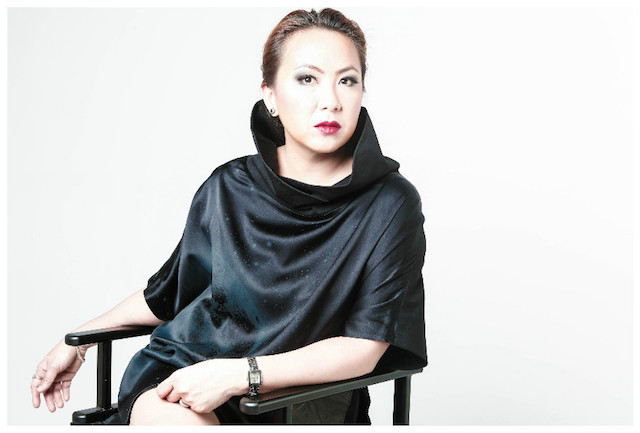We all see things and people through some sort of lenses. Now, whether they be rose-tinted ones or heavily-darkened by negative bias or prejudice, mainly depends on what we have been told, taught, and what we have experienced.
In the UAE where people from various ethnic backgrounds merge into one rich, collective melting pot, there are both opportunities to discover and learn about other people, and opportunities that may well be missed.
Lalaine Chu-Benitez, a highly successful Filipina marketer, media practitioner and entrepreneur, aware of the stereotypical image of the Filipino in the Middle East, learned early on how important it was to be honest, assertive, to just be herself, and to never put up with any type of discrimination.
What were your feelings/expectations when you first moved to Dubai? How about towards your first job here?
Just like most young people reluctant to leave friends behind, I was quite unhappy to leave the Philippines and move to Dubai 25 years ago, fresh out of college, at my parents’ request. I was part of the earlier wave of second generation Filipinos back then – children of OFs (Overseas Filipinos) who were mostly petroleum engineers.
I was offered a job as a sales staff at the Dubai Duty Free then which, I graciously turned down. Back in the day, our people were slotted into very specific job categories. If you were a Filipina, you ended up either as a domestic helper, a nurse, a saleslady or waitress, or a secretary. But I didn’t see myself fitting into that role. Fortunately, I got a break as an executive PR trainee at the Chicago Beach Hotel (now Jumeirah Beach Hotel) which suited my education and qualifications better – my writing skills and ability to communicate in basic French and German were also an asset. This led me to my first real job as PR Coordinator for the SMH Group (the umbrella company for Swatch, Omega, Rado, Longines, etc.).
Based on your earlier experiences in the UAE, how did people from other nationalities view and behave towards Filipinos in general, and Filipinas in particular?
Filipinos have always been stereotyped. The fact that our country used to be referred to as the “Sick Man of Asia,” and the amount of negative news that proliferate in international media about our government and the woes of domestic helpers, have always shaped and affected the way we have been perceived – as third class citizens who come from a woefully poor and corrupt country. During my earlier days here, I had a colleague who once told me that we get paid less compared to other nationalities, mainly because of our poor economy. I also had a colleague who, at one time, while we were discussing food and wine (a topic of interest since I grew up with an aunt who had a wine business), asked me, “So, how come you are poor?” He couldn’t believe I could talk about the finer things. His assumption was that all Filipinos who come to work here are poor and disadvantaged.
During my corporate career spent with multinational companies which required me to travel extensively, immigration officers would often take interest in my ethnicity. I have been asked several times if “I am really a Filipino” – a Filipino travelling on business carrying a multinational business card was something unfamiliar to them.
As for Filipinas, our easy-going friendly nature, Westernized ways, of course, coupled with the bad news on mail-order-brides and prostitution, to a certain extent, have given us a bad name. If you look at other countries, the latter is quite a common problem. But you just have to wonder why Filipinas are often singled out when it comes to these things.
How does one “break the Filipino mold” overseas, especially here in the Middle East? Did you make a conscious choice to not be the stereotypical Filipina? Please elaborate.
The best way of breaking the Filipino stereotype overseas is first, to work on yourself – ensure that you represent yourself well, that you are properly heard, command respect and don’t settle for anything less than you deserve. I believe in what Eleanor Roosevelt said, that “No one can make you feel inferior without your consent.”
The second thing you can do is to work on your community and contacts – contribute to debunking that mold, by helping to educate others about our people, our skills, our achievements, our talents, and what we contribute to the world.
Sometimes we are our worst promoters. Other communities do such a great job of promoting their own people – why should Filipinos shirk from that? That’s where our advocacy in Illustrado comes into play as we have taken it upon ourselves to be de facto ambassadors of goodwill for our people.
On a personal level, I don’t think I made a conscious effort to not be a stereotypical Filipina – rather, I have always believed in presenting myself as best I can, that is, 360 degrees. I also believe in fairness and refuse to tolerate discriminatory treatment.
Did you experience any difficulties in establishing yourself in the UAE? Please share some of your memorable experiences as a woman carving out a career in the Middle East.
Being a career woman trying to establish herself in the male-dominated UAE and Gulf Region is one thing, being a Filipina at that, is quite another. I’ve had my fair share of challenges climbing the career ladder, on top of the challenges of having to juggle a demanding multinational career which kept me on the go, while being a mom. I’ve experienced politics, discrimination, as well as high pressure work – but I have survived, and each step made me stronger.
I’ve broken bread with all-male teams around the region and in other parts of the world, sometimes being the lone female executive in the group (and the youngest at times). I’ve “killed” discriminatory antics from colleagues in the past, not only by standing up for myself but by being stronger, smarter and, sometimes, louder than they can be. At one point in my corporate career, I became the tough-talking Filipina whom nobody dared mess with because I am very direct and will not shirk from uncomfortable situations. I’ve emerged from my toughest career challenges just by carrying on and being resilient.
At what point in your career did you feel and say to yourself: I have arrived? Please elaborate.
I’ve always considered myself a “work in progress,” and it’s been my practice to set goal posts, whether big or small, every step of the way, so there’s always something new to aspire for. Like when I was just starting out, the biggest thing for me was just to get my business plan approved by our HQ in Switzerland. Then later on, it was being able to launch a full-blown magazine in the market. Then, it was being able to survive as an entrepreneur running an SME – a social enterprise at that. Then, of course, there are other new things that I would like to sink my teeth into.
The way I look at my career right now is that it’s not really about the work, but who you are and what you contribute, in the grand scheme of things, so it’s a continuous process. I don’t know if I will ever really say “I have arrived,” but I can tell you that I am happy and thankful for where I am at this very moment.
Tell us something about your brainchild “Illustrado,” the concept behind it, and the initial obstacles you had to contend with during its creation.
Illustrado is a social enterprise devoted to the upliftment of Filipinos in the region. Our monthly magazine “Illustrado” has served to celebrate the talents and achievements of Filipinos around the globe, connect our communities, and provide our people a window to the world, while playing the role of de facto ambassadors of goodwill for the Philippines, since it was launched in Dubai in 2006.
The slogan “Taas Noo, Filipino!” and the mission of “Helping the Filipino Flourish – Global Vision, Native Soul” define the substance, style and corporate ethos that is the basis for our distinctive approach. We combine premium production values, substantial content with a very down-to-earth philosophy, and veer off the usual media fare of gossip, scandals, sensationalism and materialism, to give rise to a progressive publication that speaks to a wide range of audiences – regardless whether they are domestic helpers, professionals, business owners or investors – because we believe that the aspiration for a better life cuts across socio-economic barriers and geographies.
Our advocacies also include initiatives such as “Women of Substance” and “Pinays Take Charge” – sister projects dedicated to promote the empowerment of Filipinas in the Gulf. We also actively support the Filipino creative community, providing talents a platform to showcase their work via the magazine and other worthwhile community projects.
It was tricky at the beginning because premium lifestyle glossies for the Filipino community here were unheard of. The perception was that only gossip rags would work – with Filipinos being considered a mass market. But we’ve always said that just because we are communicating to the masses, it doesn’t mean that we have to underestimate what they can understand and appreciate. We’ve always believed that there is space for a more substantial and aspirational publication for Filipinos, no matter how modest in life their situation is.
How has the magazine grown through the years? Please mention some important milestones.
We just released our 100th issue last October 2015, we also released a coffee table book a few years ago, did “Women of Substance” events for five years, “Day of Sisterhood” for three years, finished two documentaries on Filipina empowerment (one of which won “Best Documentary” at the Migration Advocacy Media Awards hosted by the Commission on Filipinos Overseas – Office of the Philippine President), and are looking forward to continuing what we do, and to rolling out projects to reach more people across the world.
Would you say Illustrado has somehow contributed to changing other people’s perception of the Filipino persona? Please elaborate.
Anything good that you churn out there, especially if it reaches a great number of people, would somehow change perceptions.
We’ve come from a time when it was all bad news about the Philippines: corruption, scandals and gossip. Now it’s a very common sight to see news and stories about Filipino achievers as well as Filipino women of substance coming from our side of the world. We can’t claim to be the sole initiator of that, but we are right at the forefront. We have been a huge part of that wave of positivity.
Media shapes a lot of what people believe – especially now that information is just at our fingertips. I would like to think that us being front liners in this cause has also contributed to the growth of our community in the region. Now, thankfully, Filipinos have broken glass ceilings and have better career opportunities here. And when you search for news on Filipinos – sure, you might still see some bad news, but side-by-side all that is the real good news that helps us gain recognition, respect, and get better jobs. And that’s our work. That is what we do.
What goals are you working on achieving at this time for yourself and for Illustrado?
For Illustrado, we’re currently working on a project to provide Filipino talent a convergence point on the World Wide Web. The world is very small; we would like to embrace it in its entirety. We also want to support talented Filipinos everywhere, “infect” an even greater number of minds with a more progressive way of thinking that can contribute to nation-building.
On a personal level, I’m trying to learn urban farming (J) with my hubby, and how to craft a life for our family that is joyful, balanced, sustainable, while supporting our advocacies.
I’m quite an idealist. I’m an “almost superwoman” who’s trying to have it all. At least my own definition of “all” – a fulfilling career, the ability to contribute to something larger than myself, and a happy life full of soulful sustenance.
As a marketing professional, what would be your advice to women who are still struggling to make it career-wise?
As a marketing pro, the most obvious advice would be to consider yourself as a brand. What do you stand for? How do you want to be perceived and treated? Create your career strategy according to that. It’s not a new concept; but it is one that is tried and tested to work.
Keep on learning. Work hard but keep a healthy space for yourself and your family.
Over and above that, learn the subtle difference between when you should use your feminine wiles to your advantage, and when you should stop being a girl, and compete just as you.
About the writer
Claire Dangalan is a Filipina freelance feature writer (a.k.a. Lovely Claire Cachuela) and Features Editor Ananke, based in Dubai. She is a consummate lover of the arts, especially literature. She taught Cultural Anthropology, Sociology, Humanities and Literature back in the Philippines. Her interests, aside from writing, include the environment, health and fitness, culinary arts, social issues, studies on world view, and “unprofessional photography.”
To connect or read more from Claire:
Blog: Faeriequeenbuknoy
Blog: Enthymememy
Facebook: Reduce your CO2 footprint
Twitter: Alice Red Queen
Twitter: Red CO2 Footprint











